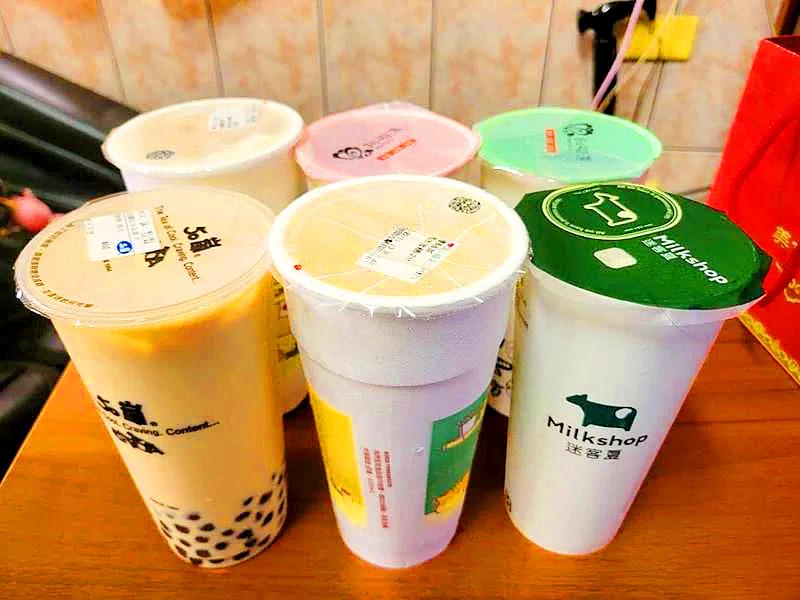Starting on July 1, stores selling takeout beverages would have to give customers who bring their own cup a discount of at least NT$5, the Environmental Protection Administration (EPA) is expected to announce today.
Last year, 2.2 billion disposable cups were used in Taiwan, which goes against the growing environmental protection trend, EPA Recycling Fund Management Board Executive Director Wang Yueh-bin (王嶽斌) said yesterday.
“Our focus has turned toward restricting the use of plastic. It is our hope that by mandating discounts for customers using their own cups, we can start to see change,” he said.

Photo: Lo Chi, Taipei Times
Aside from discounts, the EPA is also encouraging stores to make reusable cups available for customers to borrow. It hopes that by next year, 5 percent of a chain store’s outlets will have that service, with the figure rising to 10 percent by 2024 and to 30 percent by 2025, Wang said.
These measures are expected to reduce use of disposable cups by 15 percent next year, 18 percent next year and 25 percent in 2024, he said, adding that stores should post signage to inform customers about the discounts and availability of reusable cups.
The new policy is estimated to affect 50,000 stores nationwide, including beverage shops, convenience stores and fast-food restaurants, he said.
Meanwhile, the EPA had initially planned to ban polystyrene foam cups from July 1, and to authorize city and county governments to fully ban disposable cups of all materials from that date if they wished to do so, he said.
“However, after holding three seminars with beverage companies, manufacturers and environmental groups, we have changed the policy to require local governments to limit the use of disposable cups starting Dec. 31, 2024,” he said.
Industry operators have opposed an outright ban on polystyrene foam as it is said to be the best material for keeping drinks cold, and is therefore popularly used in southern Taiwan, he said.
“The industry needs more time. Therefore, we are treating polystyrene foam like other plastic, aiming to gradually reduce its use over time,” he said.

ALIGNED THINKING: Taiwan and Japan have a mutual interest in trade, culture and engineering, and can work together for stability, Cho Jung-tai said Taiwan and Japan are two like-minded countries willing to work together to form a “safety barrier” in the Indo-Pacific region, Premier Cho Jung-tai (卓榮泰) yesterday said at the opening ceremony of the 35th Taiwan-Japan Modern Engineering and Technology Symposium in Taipei. Taiwan and Japan are close geographically and closer emotionally, he added. Citing the overflowing of a barrier lake in the Mataian River (馬太鞍溪) in September, Cho said the submersible water level sensors given by Japan during the disaster helped Taiwan monitor the lake’s water levels more accurately. Japan also provided a lot of vaccines early in the outbreak of the COVID-19 pandemic,

Kaohsiung Mayor Chen Chi-mai (陳其邁) on Monday announced light shows and themed traffic lights to welcome fans of South Korean pop group Twice to the port city. The group is to play Kaohsiung on Saturday as part of its “This Is For” world tour. It would be the group’s first performance in Taiwan since its debut 10 years ago. The all-female group consists of five South Koreans, three Japanese and Tainan’s Chou Tzu-yu (周子瑜), the first Taiwan-born and raised member of a South Korean girl group. To promote the group’s arrival, the city has been holding a series of events, including a pop-up

TEMPORAL/SPIRITUAL: Beijing’s claim that the next Buddhist leader must come from China is a heavy-handed political maneuver that will fall flat-faced, experts said China’s requirement that the Dalai Lama’s reincarnation to be born in China and approved by Beijing has drawn criticism, with experts at a forum in Taipei yesterday saying that if Beijing were to put forth its own Dalai Lama, the person would not be recognized by the Tibetan Buddhist community. The experts made a remarks at the two-day forum hosted by the Tibet Religious Foundation of His Holiness the Dalai Lama titled: “The Snow Land Forum: Finding Common Ground on Tibet.” China says it has the right to determine the Dalai Lama’s reincarnation, as it claims sovereignty over Tibet since ancient times,

Temperatures in some parts of Taiwan are expected to fall sharply to lows of 15°C later this week as seasonal northeasterly winds strengthen, the Central Weather Administration (CWA) said today. It is to be the strongest cold wave to affect northern Taiwan this autumn, while Chiayi County in the southwest and some parts of central Taiwan are likely to also see lower temperatures due to radiational cooling, which occurs under conditions of clear skies, light winds and dry weather, the CWA said. Across Taiwan, temperatures are to fall gradually this week, dropping to 15°C to 16°C in the early hours of Wednesday